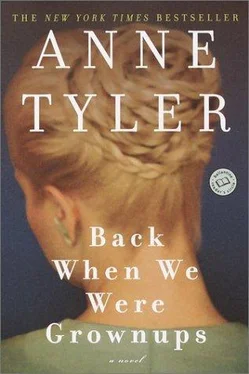While the rest of her world blurred and swam, Will grew steadily more distinct. Parts of him flashed across her vision at inappropriate moments: the authoritative curl of his fingers around his car keys, the stirringly beautiful drape of his sports coat across the back of his shoulders. His most casual remarks came back to her unbidden, weighted with significance. She replayed her own remarks and longed to change them — to make them more intelligent, more original, more alluring.
When he asked her, for instance, why she had never remarried, she had answered fliply, “Nobody ever proposed.” Which happened to be true, but there was more to it than that. A few men had made tentative moves in her direction, she should have told him, but she had felt oddly indifferent; she had felt a kind of fatigue. It had all seemed like so much trouble. (And the men, to be perfectly honest, had not persisted unduly.) Now Will would suppose that no one had found her attractive. She tried to bring it up again, hoping for a second chance. “Have you ever noticed,” she asked him, “how what you look for in a person changes as you get older? When I was young, I wanted somebody other —the most wildly other type possible. I guess that’s what drew me to Joe. But then as I got older, why, it began to seem so wearying to go out with somebody different. Maybe that’s why parents are always telling their daughters to date that nice boy from their church, while the daughters are pining for motorcyclists that later on they wouldn’t glance at.”
“Motorcyclists?” Will asked. This was over the telephone, but she could almost see the bafflement crossing his forehead.
“I mean, after a while that kind of… bridging just seems like so much work. I gave up wanting to bother with it.”
“But, Rebecca,” Will said. “What are you saying? Are you trying to tell me something? Because look at you and me: we’re totally different.”
“We are?” she asked. And then she said, “Oh, well, maybe now it might seem we are. I can see why you might think that. But don’t forget, I used to be much more introspective. I don’t know what became of that! Sometimes I hear you talk about the old days, about the way we lived our lives then and the subjects that used to interest us, and I think, Oh, yes, that was back when we were grownups. Well, you still are a grownup; even more so. But me: it seems to me that I’ve been traveling in reverse. I know less now than I did when I was in high school. I’m trying to remedy that. I hope it’s not too late.”
“I just meant that you’re more outgoing,” Will told her.
“I’m not outgoing! It’s only how I act on the surface, because of the Open Arms.”
“Ah,” he said.
But she could tell that he wasn’t convinced.
It was easier to talk on the telephone than face to face, she noticed. On the telephone they might say almost anything, but when they met they grew self-conscious. Also, his physical reality often came as a surprise. Who was this craggy, white-haired man? He was very appealing to look at, but who was he? Over the course of the evening she would adjust to this new version of him, but the next time they spoke on the telephone, she seemed to have conjured up the original Will all over again. “Hello, Rebecca,” he would say, and back came his lopsided boyhood smile, a cloud-gray sweater he had worn in junior high, and his springy corkscrew curls the color of wild honey.
* * *
She took out subscriptions to the New York Times, The New Yorker, and the New York Review of Books . (“Just what city do you imagine we’re living in?” Poppy asked when he heard.) She walked to the Enoch Pratt Library to request a copy of the memoir that she had written about in college. It turned out to be something they had to send away for through Interlibrary Loan, but she did have a long, absorbing talk with the reference librarian — a woman who seemed a real kindred spirit. Then she went home and finished reading her first Lee biography, after which she launched immediately into the second.
It emerged that Lee had felt emancipation would come about on its own, in the natural course of events. He wrote this in a letter to his wife. “Well, I never,” Rebecca told Poppy. “I had no idea Lee was such a rationalizer.”
“Lee who?” Poppy asked.
“ General Lee. Robert E. When I was a girl, I thought I was going to rewrite his chapter in history. I could not believe he would have chosen which side to fight on purely out of personal loyalty.”
“Well?” Poppy said. “What better reason?”
“How about principle? Even a wrongheaded, evil principle?”
“Robert E. Lee was one of your Virginia types,” Poppy said. “All the principle he cared for was his own little bit of acreage.”
“Not according to this memoir I came across in college,” she told him.
“Oh, well, college,” Poppy said. Then, as if he’d proved his point, he returned to his own reading — a multicolored magazine, surely not the New York Review. He was making notes on a memo pad with a promotional ballpoint pen from Ridgepole Roofers. The article he was consulting, she saw, was called “Ten Ways to Shake Up a Party.” She sighed and looked down at her book again. Lee’s wife gazed mournfully from the left page, Lee himself from the right. Rebecca caught herself wondering what kind of sex life they’d had.
* * *
Rebecca’s mother telephoned. She had been much more attentive lately — all sly questions and perky alertness, like a girlfriend hoping for confidences. “You’re home!” she said. “I thought you’d be out.”
She didn’t say why, in that case, she had bothered to call.
Rebecca said, “How are you, Mother?”
“I’m fine. How about you? No date tonight?”
“No date.”
“What did you do last night?”
“Sat home with Poppy,” Rebecca said perversely. In fact, she’d seen Will in the afternoon, but her mother hadn’t asked about the afternoon.
“Well, I just wanted to tell you that Sherry Hardy knows all about Will’s ex-wife.”
“Have you been talking to Sherry Hardy about my private business?” Rebecca demanded.
“Just who you’re going out with, is all. I really don’t remember how the subject chanced to come up.”
Rebecca groaned.
Her mother said, “Sherry’s second cousin went to Will’s wedding. She told Sherry that his wife seemed way too young for him.”
“Well, she was a former student of his. You knew that.”
“She was pretty but unlikable, according to the cousin. A discontented type. You could see it in the corners of her mouth. All during the reception, she poked fun at how stodgy Will was. At one point he made some comment that was the least little bit professor-sounding, and the bride told everybody, ‘Will is my first husband, needless to say.’ Only joking, of course, but when you consider how things turned out…”
Rebecca, who had been listening more closely than she would admit, felt a stab of pity. Will could never have held his own against that kind of woman! But she just said, “Well, that’s all water over the bridge now.”
“Dam,” her mother said.
“Pardon?”
“Water over the dam.”
“Whatever.”
“The ceremony was Catholic, or maybe just High Episcopal. This cousin wasn’t quite sure. She said there was a lot of kneeling going on. When Will was defining what a homophone was, he used feted and fetid as his examples.”
Rebecca said, “He used what?”
“ F-E-T-E-D and F-E-T-I-D . That was the comment that struck his ex-wife-to-be as professor-sounding.”
“Why was he defining a homophone at his wedding?” Rebecca asked.
Читать дальше












